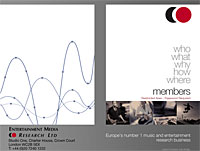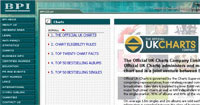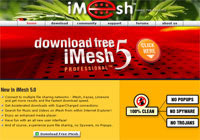 According to a survey by Entertainment Media Research, UK legal digital music downloads have grown by a thumping great 75% in a year.
According to a survey by Entertainment Media Research, UK legal digital music downloads have grown by a thumping great 75% in a year.
The 2005 Digital Music Survey also predicts that UK consumers will spend 60% more on buying music downloads in the next six months
Although 40% of UK music lovers are still grooving to music files illegally downloaded to their MP3 players and PCs, the survey found that 35% had bought legal downloads with a further 23% intending to start purchasing downloads soon.
Legal downloads are continuing to find favour with consumers, with over two thirds of illegal downloaders claiming they will download less in the future.
The survey revealed that the dwindling enthusiasm for dodgy downloading was due to user concerns about prosecution (44%), fear of viruses (29%) and inferior audio quality vs legal downloads (21%).
 These findings are supported by the news that legal digital downloads have accounted for 8% of Coldplay’s recent album sales in the US – the biggest share for any new release to date.
These findings are supported by the news that legal digital downloads have accounted for 8% of Coldplay’s recent album sales in the US – the biggest share for any new release to date.
Dutifully dissecting the digital demographic, we can reveal that the fear of getting into trouble with The Man worried 13-17 year olds (50%) and women (47%) the most, while 35-44 year olds (35%) and women (34%) were most concerned about the prospect of downloading infected and unauthorised files.
Spoddy, EQ-adjusting audio aficionados of the male variety were the most put off by the audio quality of the unauthorised tracks, with the difficulty in finding the exact right track particularly troubling music-obsessed blokes between 25-44.
The survey discovered that legal download demand is being fuelled by immediacy over price, with nearly two-thirds (63%) claiming immediate availability as being the key reason.
The ‘must-have-that-record-now’ ethos was most reflected by men in the 18-24 age group, with the price of downloads relative to CDs seen as a less important factor (43%).
 Two fifths of those surveyed preferred digital downloads because they were only interested in one or two tracks, while 29% downloaded music to sample an album before purchase.
Two fifths of those surveyed preferred digital downloads because they were only interested in one or two tracks, while 29% downloaded music to sample an album before purchase.
The survey revealed that 45% of legal downloaders buy current singles, unlike older consumers (45 years plus) who tended to know what tracks they want and were more likely to purchase 1-2 tracks from an album.
Russell Hart, Chief Executive, Entertainment Media Research, rummaged through the figures, mulled for a moment and then declared, “The findings indicate that the music industry is approaching a strategic milestone with the population of legal downloaders close to exceeding that of pirates.”
The survey was undertaken in association with law firm, Olswang, with their senior partner and Digital Lifestyles chum John Enser, commenting, “Clear deterrents to illegal downloading are emerging with fear of prosecution running high and close behind is the sense that unauthorised downloading is “not fair on the artists,” suggesting that the industry’s messages, led by the BPI, are being communicated effectively.”
 An unemployed Scottish man alleged to have carried out “the biggest military computer hack of all time” will appear in a London court today.
An unemployed Scottish man alleged to have carried out “the biggest military computer hack of all time” will appear in a London court today. United and Verizon Airfone have become the first companies to receive Federal Aviation Administration (FAA) approval to install Wi-Fi for use on US domestic commercial aircraft.
United and Verizon Airfone have become the first companies to receive Federal Aviation Administration (FAA) approval to install Wi-Fi for use on US domestic commercial aircraft. Although the FAA approval currently only applies to the cabin of United’s B757-200 aircraft, it’s an important landmark on the way to enabling full high-speed wireless Internet access on board all United aircraft.
Although the FAA approval currently only applies to the cabin of United’s B757-200 aircraft, it’s an important landmark on the way to enabling full high-speed wireless Internet access on board all United aircraft. Once a service provider is selected by the FCC, United should be able to meet their passengers’ Wi-Fi needs in double quick time with, no doubt, zillions of other airlines following their lead.
Once a service provider is selected by the FCC, United should be able to meet their passengers’ Wi-Fi needs in double quick time with, no doubt, zillions of other airlines following their lead. Saucy sensation seekers and sleazy surfers will be rewarded with their very own porn-friendly set of .xxx domains before the end of the year.
Saucy sensation seekers and sleazy surfers will be rewarded with their very own porn-friendly set of .xxx domains before the end of the year. It is hoped that pornsters will voluntarily shift from their current .com addresses, thus making it easier for parents to filter out adult material, but in an industry not exactly renowned for its high moral stance, we anticipate that not all will be wiling to switch from their lucrative, high profile domains.
It is hoped that pornsters will voluntarily shift from their current .com addresses, thus making it easier for parents to filter out adult material, but in an industry not exactly renowned for its high moral stance, we anticipate that not all will be wiling to switch from their lucrative, high profile domains. Unlike the milk-snatcher Margaret Thatcher, the ICANN’s decision proves that they are definitely for turning – in November 2000, the ICANN staff rejected ICM Registry’s first application after objecting to domains such as .kids and .xxx.
Unlike the milk-snatcher Margaret Thatcher, the ICANN’s decision proves that they are definitely for turning – in November 2000, the ICANN staff rejected ICM Registry’s first application after objecting to domains such as .kids and .xxx. In a never-ending quest to stem the flow of illegal file sharing, the UK record companies’ trade association, the BPI (British Phonographic Industry), has announced that is taking legal action against another 33 illegal filesharers in the UK.
In a never-ending quest to stem the flow of illegal file sharing, the UK record companies’ trade association, the BPI (British Phonographic Industry), has announced that is taking legal action against another 33 illegal filesharers in the UK. The BPI ramped up the pressure on March 4 this year, declaring that it intended to pursue proceedings against 31 more illegal filesharers. The offenders were sent details of the BPI’s legal claims against them yesterday after their identities were revealed by their Internet service providers.
The BPI ramped up the pressure on March 4 this year, declaring that it intended to pursue proceedings against 31 more illegal filesharers. The offenders were sent details of the BPI’s legal claims against them yesterday after their identities were revealed by their Internet service providers. All of the accused are alleged to have been indulging in an orgy of uploading involving hundreds or thousands of music files illegally and face civil action for an injunction and damages.
All of the accused are alleged to have been indulging in an orgy of uploading involving hundreds or thousands of music files illegally and face civil action for an injunction and damages. A hard drive, containing confidential data belonging to the Brandenburg police in Germany, was auctioned over eBay and bought by a student from the city of Potsdam for €20 (us$25/£14) according to a report by Spiegel, a leading weekly German newspaper.
A hard drive, containing confidential data belonging to the Brandenburg police in Germany, was auctioned over eBay and bought by a student from the city of Potsdam for €20 (us$25/£14) according to a report by Spiegel, a leading weekly German newspaper. Last year, mobile security specialists Pointsec bought a load of hard drives off Internet auctions like eBay to find out how much sensitive company information they could unearth (and publicise their expertise in the bargain, natch).
Last year, mobile security specialists Pointsec bought a load of hard drives off Internet auctions like eBay to find out how much sensitive company information they could unearth (and publicise their expertise in the bargain, natch). In a shocking example of virtual life crashing into real life, a Shanghai online game player stabbed his gaming pal in the chest multiple times after he learned that he had stolen approximately US$870 (£462/€671) from the sale of a powerful “dragon sabre”, jointly owned by both players.
In a shocking example of virtual life crashing into real life, a Shanghai online game player stabbed his gaming pal in the chest multiple times after he learned that he had stolen approximately US$870 (£462/€671) from the sale of a powerful “dragon sabre”, jointly owned by both players. Still fuming, Chengwei popped around to have a word with Caoyuan who didn’t convince with his promises to pay him for the sword.
Still fuming, Chengwei popped around to have a word with Caoyuan who didn’t convince with his promises to pay him for the sword. However, online game companies in Shanghai – the city with the most players – are planning to set up a dispute system where aggrieved players can find recourse.
However, online game companies in Shanghai – the city with the most players – are planning to set up a dispute system where aggrieved players can find recourse. Research carried out on by Infosecurity Europe has revealed that 92% of people were willing to freely dish out all the personal information needed to steal their identity in exchange for the chance to win a theatre ticket.
Research carried out on by Infosecurity Europe has revealed that 92% of people were willing to freely dish out all the personal information needed to steal their identity in exchange for the chance to win a theatre ticket. When they were told that it was a combination of their pets name and mothers maiden name, they were asked what they thought their stage name would be. Like a bunch of chumps, ninety four percent (94%) of respondees then blabbered out their mother’s maiden name and pet’s name.
When they were told that it was a combination of their pets name and mothers maiden name, they were asked what they thought their stage name would be. Like a bunch of chumps, ninety four percent (94%) of respondees then blabbered out their mother’s maiden name and pet’s name. Incredibly, the researchers did not give any verification of their identity, offering only a trusty clipboard and the offer of the chance to win a voucher for theatre tickets.
Incredibly, the researchers did not give any verification of their identity, offering only a trusty clipboard and the offer of the chance to win a voucher for theatre tickets. Microsoft has agreed – with all the enthusiasm of a child being made to eat spinach – to adopt all the “main changes” requested by the European Commission to its new version of Windows without Media player components.
Microsoft has agreed – with all the enthusiasm of a child being made to eat spinach – to adopt all the “main changes” requested by the European Commission to its new version of Windows without Media player components. Horacio Gutierrez, a lawyer for Microsoft, was clearly not too happy, telling Reuters that the company has “some misgivings about the chosen name, as we fear it may cause confusion for consumers about the product, but we will adopt the Commission’s name in order to move forward and accelerate the pace of the implementation process.”
Horacio Gutierrez, a lawyer for Microsoft, was clearly not too happy, telling Reuters that the company has “some misgivings about the chosen name, as we fear it may cause confusion for consumers about the product, but we will adopt the Commission’s name in order to move forward and accelerate the pace of the implementation process.” And there’s more! Microsoft are also in disagreement with the EU over plans to appoint a trustee to monitor Microsoft’s compliance (or the complete lack of) – if the company fail to comply with the Commission’s decisions, they could face a daily slapdown of up to US$5 million – the equivalent of a cup of coffee in Bill Gates’ world.
And there’s more! Microsoft are also in disagreement with the EU over plans to appoint a trustee to monitor Microsoft’s compliance (or the complete lack of) – if the company fail to comply with the Commission’s decisions, they could face a daily slapdown of up to US$5 million – the equivalent of a cup of coffee in Bill Gates’ world. A large question mark hangs over the future of aggregated news sites supplied by Web companies such as Google after it was revealed that Agence France-Presse had sued the world’s most popular search engine for alleged copyright infringement.
A large question mark hangs over the future of aggregated news sites supplied by Web companies such as Google after it was revealed that Agence France-Presse had sued the world’s most popular search engine for alleged copyright infringement. “AFP has over 600 online clients using their news services, sites like Political Gateway. Being blacklisted by the number one search engine in the world is enough to make a news site immediately drop AFP and go to another news service like AP, Reuters, UPI, and the like. We know this to be true because Political Gateway is looking at options right now.
“AFP has over 600 online clients using their news services, sites like Political Gateway. Being blacklisted by the number one search engine in the world is enough to make a news site immediately drop AFP and go to another news service like AP, Reuters, UPI, and the like. We know this to be true because Political Gateway is looking at options right now.